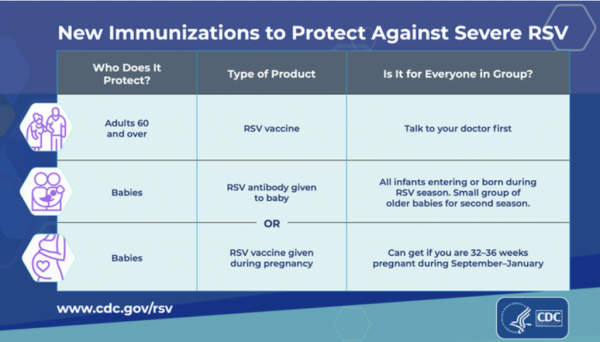Protect Your Child From RSV
Respiratory syncytial virus, or RSV, is a common virus that affects the lungs.
RSV is the LEADING CAUSE of infant hospitalization in the U.S.
RSV season starts in the fall and peaks in the winter in most regions of the U.S
WHAT RSV MEANS FOR BABIES AND CHILDREN
RSV can be dangerous for infants and young children. Each year in the United States, an estimated 58,000-80,000 children younger than 5 years are hospitalized due to RSV infection. Children at greatest risk for severe illness from RSV include the following:
Premature infants
Infants up to 12 months, especially those 6 months and younger
Children younger than 2 years with chronic lung disease or congenital (present from birth) heart disease
Children with weakened immune systems
Children who have neuromuscular disorders, including those who have difficulty swallowing or clearing mucus secretions
SYMPTOMS OF RSV
RSV may not be severe when it first starts. However, it can become more severe a few days into the illness. Early symptoms of RSV may include:
Runny nose
Eating or drinking less
Cough, which may progress to wheezing or difficulty breathing
RSV IN INFANTS 6 MONTHS AND YOUNGER
Infants who get an RSV infection almost always show symptoms. This is different from adults, who can sometimes get RSV infections and not have symptoms. In very young infants (less than 6 months old), the symptoms of RSV infection may include:
Irritability
Decreased activity
Eating or drinking less
Apnea (pauses in breathing for more than 10 seconds)
Fever may not always occur with RSV infections.
Call your healthcare provider if you or your child is having difficulty breathing, not drinking enough fluids, or experiencing worsening symptoms.
RSV IMMUNIZATIONS TO PROTECT INFANTS AND TODDLERS
There are two ways to protect your baby from getting very sick with RSV. One is an RSV vaccine given during pregnancy. The other is an RSV immunization that provides antibodies to your baby after birth. If you receive RSV vaccine while pregnant, your baby will have protection and, in most cases, should not need an RSV immunization later.
The two options to protect your baby are:
-
Getting an RSV vaccine if you are 32-36 weeks pregnant during RSV season. This vaccine is recommended during September through January for most of the United States because RSV is typically a fall and winter virus. The seasonality of RSV season may vary depending on where you live, and state, local, or territorial health departments may recommend different timing for administration for their area.
-
Getting an RSV antibody immunization for your baby if they are younger than 8 months and born during, or entering, their first RSV season. In rare cases, a healthcare provider may determine an RSV immunization is needed for an infant even though the mother received an RSV vaccine.
A dose of RSV antibody is also recommended for children between the ages of 8 and 19 months entering their second RSV season who are in at least one of these groups:
-
Children who have chronic lung disease from being born prematurely
-
Children who are severely immunocompromised
-
Children with cystic fibrosis who have severe disease
-
American Indian and Alaska Native children

